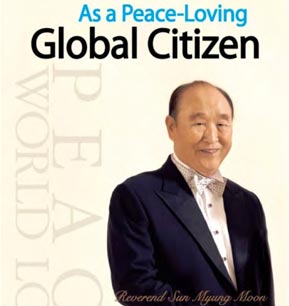ShareThis
Rev. Sun Myung Moon

As a Peace-loving Global Citizen is the autobiography of Rev. Sun Myung Moon, the founder of the Unification Movement. It was published in 2009 in both Korean and English by Gimm-Young Publishers of Seoul, South Korea. The book was released in South Korea on March 9, 2009 and debuted at #3 on the Businesss bestseller's list. It has ranked in various bestseller lists since then and was ranked 15th on the General bestseller's list as of October 14, 2009.
CHAPTER TWO - A River Of Heart Flows With Tears
Heungnam Prison in the Snow
The most valued possession in prison a.er food was a needle and thread. Our clothes would wear out and be torn during the hard labor, but it was difficult to get a needle and thread to mend them. After a while prisoners began to look like beggars in rags. It was very important to mend the holes in our clothes in order to block, even a little, the cold winter winds. A small piece of cloth found lying on the road was extremely valuable. Even if the cloth were covered with cow dung, the prisoners would fight each other to try to pick it up. Once as I was carrying the bags of fertilizer I discovered a needle stuck in one of the bags. It must have been left there accidentally when the bag was made. From that time, on I became the seamster of Heungnam Prison. It was such a joy to find that needle. Every day I mended pants and knee breeches for other prisoners.
Even in the middle of winter it was so hot inside the fertilizer factory that we would sweat. So you can imagine how unbearable it was during the summer. Not even once, however, did I roll up my pants and let my shins show. Even during the hottest part of the summer I kept my pant legs tied in the traditional Korean fashion. Others would take off their pants and work in their underwear, but I kept myself properly dressed. When we finished work our bodies would be covered with sweat and fertilizer dust, and most prisoners would take off their clothes and wash themselves in the filthy water that flowed from the factory. I, however, never washed myself where others could see my body. Instead, I would save half of the single cup of water we were rationed each day, then get up early in the morning while the others still slept to wipe myself off with a small piece of cloth dipped in that half cup of water. I also used this time early in the morning to focus my spirit and pray. I considered my body to be precious, and I didn’t want to casually expose it to others.
The prison cell held thirty-six people, and I took a small corner next to the toilet. In this space no one would step over me, but nobody wanted this space. We called it a toilet, but actually it was only a small earthenware jar without even a lid. Fluid would overflow from the toilet in the summer and it would freeze in the winter. There is no describing the putrid smell that came from it. The prisoners often experienced diarrhea because of the salty soup and hard rice balls that we ate every day.
Even in the middle of winter it was so hot inside the fertilizer factory that we would sweat. So you can imagine how unbearable it was during the summer. Not even once, however, did I roll up my pants and let my shins show. Even during the hottest part of the summer I kept my pant legs tied in the traditional Korean fashion. Others would take off their pants and work in their underwear, but I kept myself properly dressed. When we finished work our bodies would be covered with sweat and fertilizer dust, and most prisoners would take off their clothes and wash themselves in the filthy water that flowed from the factory. I, however, never washed myself where others could see my body. Instead, I would save half of the single cup of water we were rationed each day, then get up early in the morning while the others still slept to wipe myself off with a small piece of cloth dipped in that half cup of water. I also used this time early in the morning to focus my spirit and pray. I considered my body to be precious, and I didn’t want to casually expose it to others.
The prison cell held thirty-six people, and I took a small corner next to the toilet. In this space no one would step over me, but nobody wanted this space. We called it a toilet, but actually it was only a small earthenware jar without even a lid. Fluid would overflow from the toilet in the summer and it would freeze in the winter. There is no describing the putrid smell that came from it. The prisoners often experienced diarrhea because of the salty soup and hard rice balls that we ate every day.
Wednesday, November 24, 2010
|
Labels:
Heungnam Prison in the Snow part1
|
CONTENT
- FOREWORD
- CHAPTER ONE - Food is Love
- CHAPTER TWO - A River of Heart Flows with Tears
- CHAPTER THREE - The Man with the Fullest Stomach
- CHAPTER FOUR - Why We Work Globally
- CHAPTER FIVE - True Families Create True People
- CHAPTER SIX - Love Will Bring Unification
- CHAPTER SEVEN - Future of Korea, Future of the Wor...
- CHAPTER EIGHT - Message for Young People
